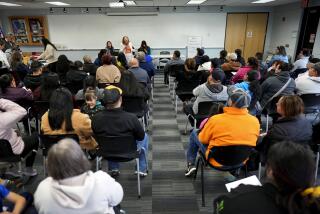Tougher rules on policing illegal immigrants

Luz Maria Diaz knew what happened to illegal immigrants at the Wake County jail. But her teenage daughters didn’t.
So when the girls were arrested after fighting on their high school campus in September, they freely admitted that they were born in Mexico. Detention officers at the jail checked their immigration status and promptly handed them over to federal authorities.
Now Diana, 16, and her sister, Yolanda, 18, are battling to stay in the country.
“I never thought this could happen . . . for a simple fight,” their mother said. “I was in shock.”
The Wake County Sheriff’s Department is one of eight local law enforcement agencies in North Carolina and 66 across the nation authorized by the federal government to identify illegal immigrants and process them for possible deportation under a program known as 287(g). Virginia is the only other state with more participating agencies. There are four such agreements in California, including one with the Los Angeles County Sheriff’s Department.
Immigrant advocates and some lawmakers have been highly critical of the program because of reports of racial profiling and civil rights violations. The Congressional Hispanic Caucus has called for an end to the program.
Responding to concerns, the Obama administration announced in July that participating agencies would be subject to federal supervision and required to focus their efforts primarily on serious and violent criminals. Police agencies must sign new agreements by today. Los Angeles County sheriff’s officials are still in negotiations but expect to continue immigration screening in the jails.
If police agencies fail to follow the new rules, they risk losing their enforcement authority, said Alonzo Pena, deputy assistant secretary at U.S. Immigration and Customs Enforcement.
One high-profile participant, Joe Arpaio, sheriff of Maricopa County in Arizona, who is being investigated by the Department of Justice, said last week that federal authorities are stripping him of his authority to make immigration arrests on the streets.
Wake County Sheriff Donnie Harrison, who joined the federal program in June 2008 and signed a new agreement Tuesday, said his deputies would continue arresting people in minor crimes, including traffic violations, if they fail to provide valid identification, and would continue checking the immigration status of foreign-born people taken to his jail. As of Oct. 1, the sheriff’s staff had interviewed about 3,760 foreign-born inmates and processed about 2,650 for possible removal.
Whether immigration authorities move forward with deportation is up to them, Harrison said.
“That’s an ICE problem,” he said. “We’re going to continue to do our job.”
Wanting a better life
Diaz led her daughters across the border more than 10 years ago to seek a better life for them. If her daughters are ordered deported to Mexico, Diaz, 35, said, the whole family -- including her U.S.-born son -- will go too. She can’t imagine sending her daughters alone to Mexico, a country they don’t really know.
Yolanda Diaz, who was arrested on a charge of simple assault, said the arrest has dashed her plans of going to college in the United States. Her sister, Diana, arrested on a disorderly conduct charge, said she just wants to graduate from her high school.
“It’s not fair,” she said. “Other people have done much worse things than this.”
Their attorney, Marty Rosenbluth with the Southern Coalition for Social Justice, said the government’s 287(g) program wasn’t designed to pick up illegal immigrants like the Diaz sisters. “I appreciate that they are saying they are prioritizing dangerous criminal aliens,” he said. “That is not what we are seeing.”
Another one of his clients, Luis Cruz Millan, 30, an illegal immigrant from Mexico, was ordered to report to an immigration officer after being arrested last month for allegedly listening to music too loudly in a car outside the Raleigh house where he was living.
He and his fiancee, Belinda Masterman, a U.S. citizen, had gotten into an argument, so Cruz went to the car to calm down. A neighbor called police, who arrested Cruz. Masterman said she begged them not to take Cruz to jail. Cruz said he believes that illegal immigrants who commit serious crimes should be deported. But, he said, “I never imagined I would be deported for listening to music.”
One night last month, immigration attorney Jim Melo stood in front of a class of about 20 immigrants in Durham and explained how 287(g) worked and advised them what to do if stopped by police. “Outside of showing your identification, it’s not necessary to answer their questions,” he said.
He also warned them that different areas in North Carolina apply the law differently.
“In Wake County, if they arrest you for whatever reason -- speeding, driving without a license -- boom. There’s immigration,” he said.
When he was finished speaking, the audience peppered him with questions: When do you ask to see an immigration judge? Is it a crime to drive without a license? If you are arrested for driving without a license, are you in danger of deportation?
Demographic shifts
Drawn by jobs in agriculture, the textile industry and more recently construction, Latino immigrants began settling in large numbers throughout North Carolina in the 1990s, dramatically changing the demographics of the state.
Between 2005 and 2007, the state’s Latino population was estimated at 596,000, up from 77,000 in 1990, according to U.S. Census data. In some areas, including Alamance County, the large influx of immigrants created tension with longtime residents.
Many new Latino residents moved into the towns of Burlington and Graham, finding jobs, starting families and opening businesses. But along with those immigrants looking for work, Sheriff Terry Johnson said, other new arrivals began committing crimes. And because the federal government wasn’t enforcing immigration law, Johnson said, he had to.
Since the county joined the 287(g) program in 2007 and many illegal-immigrant drug traffickers and gang members have been arrested and deported, Johnson said, violent crime has dropped. “Immigrants know if you come to Alamance County for the purpose of committing crime, we are going to get you,” he said.
One day last month, occupants of the Alamance County Jail -- which also holds ICE detainees from other counties awaiting deportation -- included a man who had been deported three times and another illegal immigrant who said he had served time for killing a person in a car accident.
Johnson acknowledged that not all illegal immigrants taken to the jail are suspected of violent crimes. Many are arrested on minor charges, such as driving without a license. If the traffic or criminal case is dismissed, illegal immigrants are turned over to ICE for possible deportation.
The sheriff’s decision to sign up for the federal program earned him respect from longtime residents but created a sense of fear among immigrants.
Galvanized by several high-profile arrests and deportations, several activists formed a group called Fairness Alamance to challenge the sheriff and county officials over 287(g). They accused the sheriff of racial profiling and using the law to get illegal immigrants accused of committing minor crimes out of the country.
“The law became a weapon in the hands of law enforcement,” said Blanca Zendejas Nienhaus, a teacher and member of the group. Now, Zendejas Nienhaus said she and others are pushing for the county to abide by the federal government’s new rules and target only violent criminals.
“Time and goodwill will tell if they are going to make any change,” she said.
More to Read
Start your day right
Sign up for Essential California for news, features and recommendations from the L.A. Times and beyond in your inbox six days a week.
You may occasionally receive promotional content from the Los Angeles Times.






